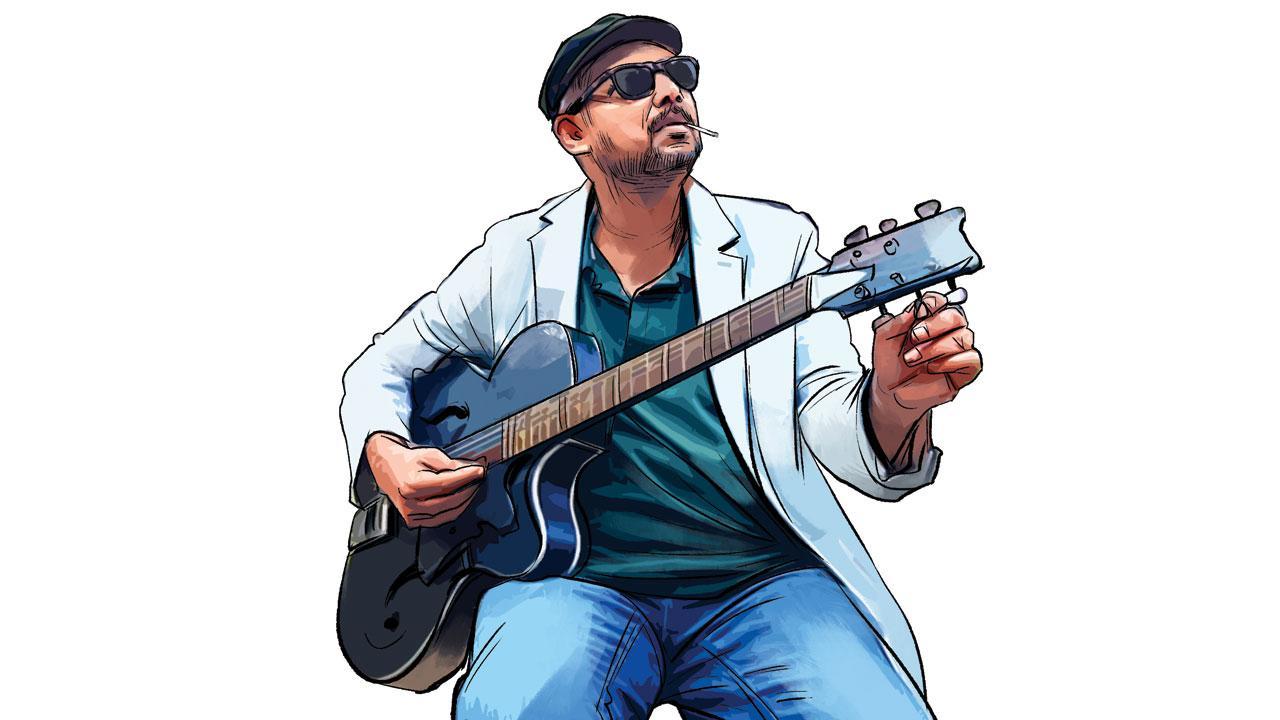I visit the offices of SVF, among the biggest film production houses in Kolkata, and hear that the number of shooting days of the average Bengali film is an appalling 13 days approximately

Illustration/Uday Mohite
![]() As you may know, dear reader, I have a long and intense relationship with Kolkata, and with the Bengali language.
As you may know, dear reader, I have a long and intense relationship with Kolkata, and with the Bengali language.
When I visit the city, I’m so honoured to meet the wonderful singer-composer-actor-filmmaker Anjan Dutt, and his musician son Neel Dutt, at their home, close to Park Street. We chat about his work and last film Chalchitra Ekhon (Kaleidoscope Now), an impressive and moving reflection of his lifelong relationship with filmmaker-mentor Mrinal Sen, with powerful performances by Sawon Chakraborty and Dutt himself. But I’m too tongue-tied to tell him that I’ve adored his songs since the 1990s, including Debalina, Kolkata 16 and Bela Bose. The last, a great favourite, also known as 2441139, is the phone number a young man dials, to tell his fiance Bela Bose that he’s finally got a job... but you sense it’s too late and she’s going to be “married off” to someone else. The song remains insanely popular and is probably historic, in that it has spawned a host of “reply songs” composed by swooning women singers/fans, including Dipanwita Bhattacharjee’s “Reply of Bela Bose” (about “hajar hajar” Bela Boses waiting for his call), Mouli Banerjee’s Bela Bolchi, and more. Friends introduced me to Moheener Ghoraguli (Moheen’s Horses), the older, gorgeous baul/jazz band (Bhalo Lage; Prithibita Naki), Kabir Suman (Tomake Chai), Bonnie Chakraborty’s Oikyotaan, the baul fusion band, and more—apart from Rabindrasangeet and baul songs, of course.
I visit the offices of SVF, among the biggest film production houses in Kolkata, and hear that the number of shooting days of the average Bengali film is an appalling 13 days approximately. What?? It may be one of the many reasons Bengali cinema has long lost its prime position among the finest of Indian cinema, to Malayali and even Tamil cinema. But one thing that cheers me up is their Rituparno (Ghosh) Room, with plush purple velvet sofas, a spectacular chandelier overhead, a sitar and a guitar cohabiting, and his multi-coloured khadi jacket in a glass display.
Next on my list is Seagull Books in Bhowanipore, a gorgeous, hushed, pink shelved bookstore, with beautifully designed books. Its Spring 2024 titles read: KG Subramanyan, Monica Cantiena, Jana Bodnaroa, Samira Nagrouche, Nancy Adajania, Ulrike Almut Sandig, Cyril Wong, Monika Kompanikova, Akram Alkatreb, Alexander Kluge, Ranjit Hoskote, Nabarun Bhattacharya. My brain is swimming. Later I meet the Seagull Founder-Publisher Naveen Kishore at his lively, art-filled office upstairs, and ask how he manages to keep it running with these heavy-duty names? Apparently, high quality translations, and overseas and local sales keep him afloat.
I’m working on a few projects and have meetings across town. I met Samik Bandyopadhyay, senior scholar, editor and critic of art, theatre, film, who was kind enough to invite me to his Golf Green residence. He was very generous with his advice. Every room in his house has towers of books, some on shelves, others in convivial piles, and his drawing room seems to have just enough wiggle room for himself and a guest. It was so comforting to visit him, and as my home is similar, I returned with a big grin on my face. The next day, I met Sudeshna Roy at Flury’s on Park Street. I am dazzled by her because we postponed a meeting as she’s working on the field with a team that’s raiding a gang that’s trafficking women. Gosh, so inspiring. She has been chairperson, West Bengal Commission for Protection of Child Rights. She is feisty and inspiring. I wrap up the day with dinner at Moulin Rouge, with the Bitchitra Collective, of which I’m a member: it’s a group mainly of women docu makers in India and the US. I met many feisty filmmakers including Farha Khatun, Debalina Majumder, Director of Photography Modhura Palit, and more.
One of the highlights was meeting Kasturi Basu and Dwaipayan Basu, founders of the 10th Kolkata People’s Film Festival, organized by the People’s Film Collective, funded by the people and run by volunteers. It showcases contemporary politically committed films from South Asia, and its guests have included Arundhati Roy, and renowned filmmakers Anand Patwardhan, Deepa Dhanraj and Meghnath. What’s more: they walk the talk. During Covid, when schools shut down, they started the Rokeya Shiksha Kendra at Patuli, a learning centre for children from marginalized communities; the 40 kids admitted have now grown to 160 children; the centre continues after regular schools reopened, and evening meals are also served to the students. It feels like a pilgrimage to me, as I’m a huge fan of Rokeya Sakhawat Hossain (1880-1932), Bengali Muslim feminist, educationist and author of Sultana’s Dream, in 1905, 10 years before the American literary feminist movement. What’s more, they further resist communal forces: they are part of a Facebook group called “Open A Door” that brings together house-owners in the city who will let out their properties without discrimination on the grounds of caste, gender, religion and marital status. It’s an active group and posts declare: “Free of discrimination of any kind.” And another states: “No restrictions.”
Can you imagine that happening in Bombay? Why not?
Meenakshi Shedde is India and South Asia Delegate to the Berlin International Film Festival, National Award-winning critic, curator to festivals worldwide and journalist.
Reach her at meenakshi.shedde@mid-day.com
 Subscribe today by clicking the link and stay updated with the latest news!" Click here!
Subscribe today by clicking the link and stay updated with the latest news!" Click here!










